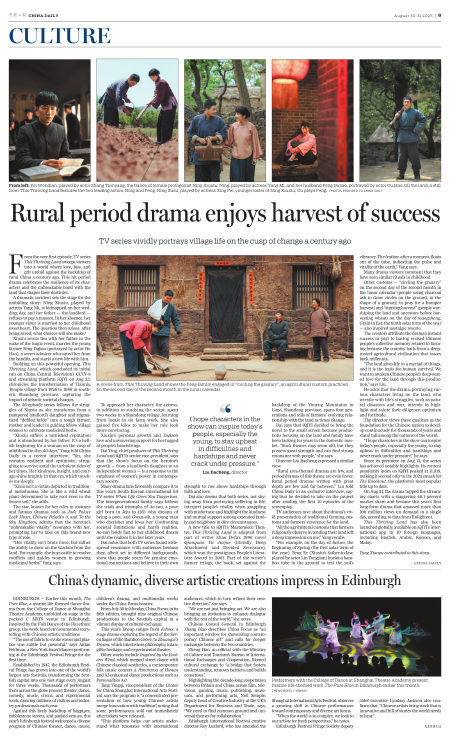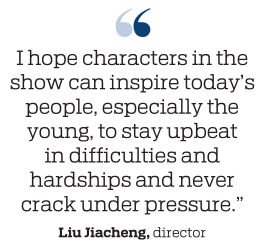
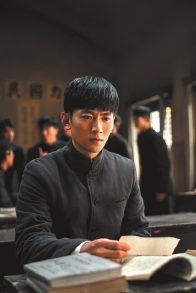
Fei Wendian, played by actor Zhang Tianyang, the fiance of female protagonist Ning Xiuxiu.
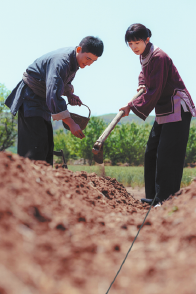
Ning, played by actress Yang Mi, and her husband Feng Dajiao, portrayed by actor Ou Hao, till the land.
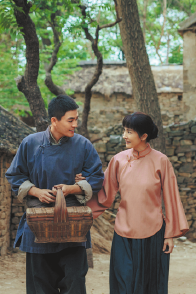
A still from This Thriving Land features the two leading actors, Ning and Feng.
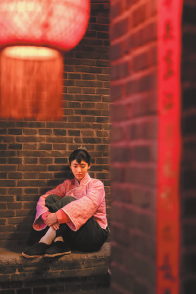
Ning Susu, played by actress Xing Fei, younger sister of Ning Xiuxiu.
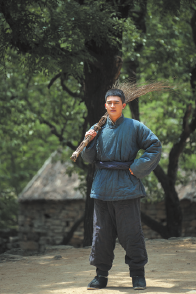
Ou plays Feng.
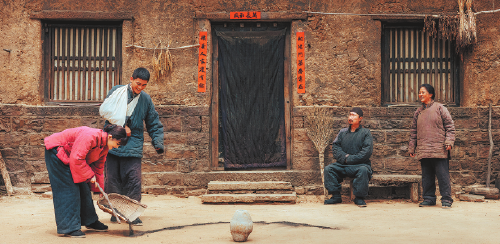
A scene from This Thriving Land shows the Feng family engaged in "circling the granary", an agricultural custom practiced on the second day of the second month in the lunar calendar.
From the very first episode, TV series This Thriving Land sweeps viewers into a world where love, loss, and grit unfold against the backdrop of rural China a century ago. This hit period drama celebrates the resilience of its characters and the unbreakable bond with the land that shapes their destinies.
A dramatic incident sets the stage for the unfolding story: Ning Xiuxiu, played by actress Yang Mi, is kidnapped on her wedding day, and her father — the landlord — refuses to pay a ransom. In her absence, her younger sister is married to her childhood sweetheart. The question then arises: after being saved, what choices will she make?
Xiuxiu severs ties with her father in the wake of the tragic event, marries the young farmer Feng Dajiao (portrayed by actor Ou Hao), a secret admirer who saved her from the bandits, and starts a new life with him.
Building on this powerful opening, This Thriving Land, which concluded its initial run on China Central Television's CCTV-8 and streaming platform iQIYI on Aug 23, chronicles the transformation of Tianniu Temple village from 1926 to 1986 in southern Shandong province, capturing the impact of seismic societal changes.
The 36-episode series follows the struggles of Xiuxiu as she transforms from a pampered landlord's daughter and stigmatized "defiled bride" into a tough farmer, mother and leader in guiding fellow village women to cultivate medicinal herbs.
"Xiuxiu suffers a tarnished reputation and is abandoned by her father. It's a hellish beginning for a woman on the cusp of adulthood in the old days," Yang told China Daily in a recent interview. "Yet, she remains resilient and optimistic, struggling to survive amid the turbulent tides of her times. Her kindness, insight, and courage shine brightly in that era, which touches me deeply.
"Xixiu isn't a victim depicted in traditional melodramas. She is like a wild wheat plant determined to take root even in the frozen soil," she adds.
The star, known for her roles in costume and fantasy dramas such as Jade Palace Lock Heart, Chinese Paladin 3, and To the Sky Kingdom, admits that the heroine's "unbreakable vitality" resonates with her, prompting her to take on this brand-new type of role.
"Her vitality isn't brute force, but rather the ability to draw on the wisdom from the land. For example, she buys cattle to resolve conflicts and guides women in growing medicinal herbs," Yang says.
To approach her character, the actress, in addition to studying the script, spent two weeks in a Shandong village, learning from locals to do farm work. She also gained five kilos to make her role look more convincing.
Xiuxiu's personal growth and Dajiao's love and unwavering support for her tugged at people's heartstrings.
Dai Ying, chief producer of This Thriving Land and iQIYI's senior vice-president, says that the show's focus on the heroine's growth — from a landlord's daughter to an independent woman — is a response to the emphasis of women's power in contemporary society.
Many drama fans favorably compare it to this year's South Korean international hit TV series When Life Gives You Tangerines. The intergenerational family saga follows the trials and triumphs of Ae-sun, a poor girl born in Jeju in 1951 who dreams of being a poet, and Gwan-sik, a young man who cherishes and loves her. Confronting societal limitations and harsh realities, Ae-sun holds fast to her childhood dream until she realizes it in her later years.
Dai notes that both TV series found widespread resonance with audiences because they, albeit set in different backgrounds, show that people yearn for genuine emotional connections and believe in their own strength to rise above hardships through faith and love.
Dai also deems that both series, not shying away from portraying suffering in life, interpret people's vitality when grappling with misfortune and highlight the kindness and mutual support among extended family and neighbors in dire circumstances.
A new title to iQIYI's Masterpiece Theatre, This Thriving Land is adapted from part of writer Zhao Defa's 1996 novel Qianquan Yu Juejue (literally Deep Attachment and Decided Severance), which won the prestigious People's Literature Award in 2001. Part of the writer's farmer trilogy, the book, set against the backdrop of the Yimeng Mountains in Linyi, Shandong province, spans four generations and tells of farmers' evolving relationship with the land as times change.
Dai says that iQIYI decided to bring the novel to the small screen because productions focusing on the land and family have been lacking for years in the domestic market. "Such themes may seem old, but they possess great strength and can find strong resonance with people," she says.
Director Liu Jiacheng expressed a similar view.
"Rural area-themed dramas are few, and period dramas of this theme are even fewer. Rural period dramas written with great depth are few and far between," Liu told China Daily in an exclusive interview, saying that he decided to take on the project after reading the first 10 episodes of the screenplay.
TV audiences rave about the drama's vivid presentation of traditional farming customs and farmers' reverence for the land.
"All the agricultural customs that farmers religiously observe in tending their land left a deep impression on me," Yang recalls.
"For example, on the day of lichun, the Beginning of Spring (the first solar term of the year), Feng Er (Xiuxiu's father-in-law, played by actor Lin Yongjian) buries a bamboo tube in the ground to test the soil's vibrancy. The feather, after a moment, floats out of the tube, indicating the pulse and vitality of the earth," Yang says.
Many drama viewers comment that they have seen similar rituals in childhood.
Other customs — "circling the granary" on the second day of the second month in the lunar calendar (people using charcoal ash to draw circles on the ground, in the shape of a granary, to pray for a bumper harvest) and "starting harvest" (people worshiping the land and ancestors before harvesting wheat) on the day of mangzhong, Grain in Ear, the ninth solar term of the year — also inspired nostalgic reverie.
The creators attribute the drama's instant success in part to having evoked Chinese people's collective memory related to farming because the country hails from a deep-rooted agricultural civilization that traces back millennia.
"The land gives life to a myriad of things, and it is the basis for human survival. We want to awaken Chinese people's deep-seated love for the land through this production," says Liu.
He adds that the drama, portraying various characters living on the land, who wrestle with life's struggles, such as natural disasters and war, intends to highlight and salute their diligence, optimism and fortitude.
The director views these qualities as the foundation for the Chinese nation to develop continuously for thousands of years and stand tall among the nations of the world.
"I hope characters in the show can inspire today's people, especially the young, to stay upbeat in difficulties and hardships and never crack under pressure," he says.
Since its premiere on Aug 13, the series has achieved notable highlights. Its content popularity index on iQIYI peaked at 11,018, making it second only to the 2023 smash hit The Knockout, the platform's most popular title up to date.
On Aug 21, the drama topped the streaming charts with a staggering 46.1 percent market share and became this year's first long-form drama that amassed more than 100 million views on demand in a single day, according to data from Enlightent.
This Thriving Land has also been launched globally, available on iQIYI's international app in 10 foreign languages, including English, Arabic, Korean, and Malay.
